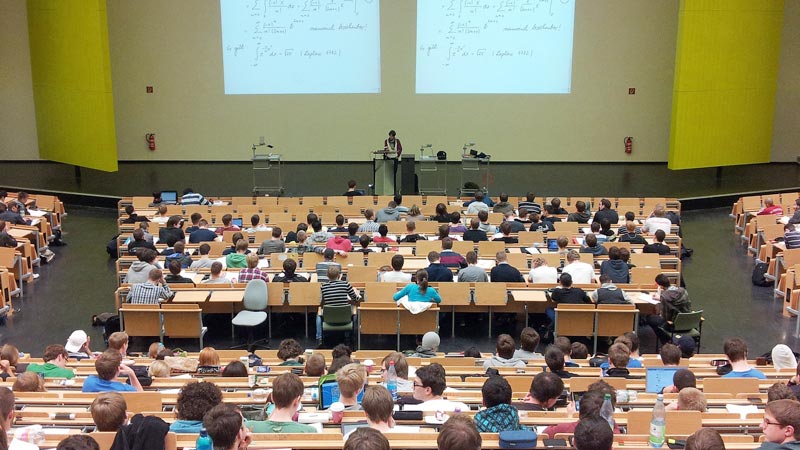Education and schooling
Free schooling in Germany enables all children to get a good education and enjoy the same chances of a successful working life.

Free schooling in Germany enables all children to get a good education and enjoy the same chances of a successful working life.

Education is very important in Germany because good qualifications increase a person’s chances of living a good life. That is why schooling is mostly free of charge in Germany. The government wants all girls and boys to be given a good start in life. To make this possible schooling is compulsory up to the age of 16.
This idea of compulsory schooling may sound negative to some. But it is actually a very positive thing because it enables every child – irrespective of how much the parents earn – to complete schooling. In Germany education is the responsibility of the federal states and although each state has its own peculiarities, the school systems are quite similar throughout the country. That enables us to explain the most important features here.

From the age of three lots of children attend nursery until they are six. However, attendance is not compulsory. It is good if a child can stay for a long time in the familiar environment of the family. But nursery attendance can also be important, e.g. to get to know friends of similar age or learn German.
That is why we recommend you think about registering your child at a nursery if little or no German is spoken in your home. When children start school and cannot speak much German, they are at a disadvantage because they cannot properly understand the lessons. At nursery children learn in a playful way the initial skills they need for school. For the under-threes there are crèches in many places.

In Germany all children from the age of six attend school. For the first four years they go to primary school, where they learn to read, write and do basic maths. Towards the end of their time at primary school the teachers and the parents jointly decide which secondary school the child should attend. Depending on their interests and school achievement up to then, a child can attend a grammar school or some form of middle school. In some federal states the secondary school may be a comprehensive school that mixes the traditional forms of German schooling.
The various schools differ in the number of years the pupils take to reach a leaving certificate and in the subsequent job prospects. Some pupils leave school after nine years (i.e. five years at secondary school) with a so-called Hauptschule qualification, others after ten (i.e. six years at secondary school) with a Realschule qualification. Both these school-leaving certificates qualify pupils to apply for an apprenticeship, but the more demanding apprenticeships mainly expect ten years of schooling.
At Germany’s grammar schools pupils can take their A-levels/baccalaureat (Abitur) after 12 or 13 years. At tertiary colleges the school-leaving qualification is known as a vocational baccalaureate (Fachabitur). With an Abitur school-leaving certificate a pupil can apply to study at a university and with a Fachabitur qualification for a place at a polytechnic. The German educational system is extremely diverse, with the result that for each and every child the right educational pathway can be found, i.e. one that suits his or her interests and capabilities.

It is important to differentiate between education and upbringing. In Germany it is the parents who are basically responsible for the upbringing of their children. Parents play a key role in a child’s development, whereas a school is only responsible for a child’s education.
Every pupil in Germany goes to school with some basic ‘equipment’: pens/pencils and paper/notebooks in a satchel. At school the pupils are provided with learning materials, e.g. books or printouts. If the children are given homework, they are expected to do it in the afternoon or evening and bring their completed homework back to school, often the next day. With younger children an adult will normally help with the homework, whereas older children normally do it on their own.
In Germany teachers are not allowed to hit children – corporal punishment is absolutely forbidden! If a child misbehaves, they will be warned about their behaviour. If it is a case of serious or repeated misbehaviour, the pupil may well be told to do additional tasks or a letter will be sent to the parents. If all this does not help, a pupil may well be expelled from the school. In such cases, the parents have to look for another school that will accept the child.

Any pupil who has at least achieved a Hauptschule certificate after nine years of schooling can apply for a vocational training course (aka apprenticeship). This normally involves working several days a week at a firm and attending a vocational training college on one or two days. Anybody who has obtained a German vocational training qualification will have a very high standing in other countries, as these courses give students a lot of vocationally relevant know-how combined with on-the-job work experience.
There are many different kinds of university courses in Germany. One interesting option are the so-called dual courses where work experience at a firm is combined with university studies. Professions such as doctors or teachers can only be studied at university. An excellent knowledge of German and a good or very good baccalaureate (Abitur) are the prerequisites for studying at a university in Germany.
Lifelong learning is very important in Germany. Even people who have a job are expected to attend further training courses to increase their skills and stay up to date. In many occupations it is also possible to attend courses to become a master craftsman or evening classes to study for the baccalaureate. In addition, open universities offer correspondence courses so people can improve their career chances.